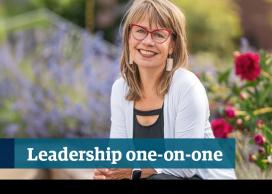Dr. Gail Murphy is the Vice-President, Research & Innovation (VPRI). In addition to her role in the VPRI office, Dr. Murphy is a professor in UBC’s Department of Computer Science.
Dr. Murphy joined UBC in 1996 and was a key driver of data science initiatives in the Faculty of Science. Her research focuses on improving the productivity of software developers and knowledge workers by providing the necessary tools to identify, manage and coordinate the information that matters most for their work.
Dr. Murphy is a Fellow of the Royal Society of Canada and an Association for Computing Machinery (ACM) Distinguished Scientist, as well as co-founder, board member and former Chief Scientist at Tasktop Technologies Incorporated.
Q1. What quality do you most admire in a leader?
GM: The quality I most admire in a leader is the ability to collaborate on problems, as well as the ability to identify solutions and articulate them into action.
Q2. What makes you laugh?
GM: Good storytelling. My dad was a great storyteller and he would have us in stitches. I also find humour in situational comedy — laughter is so important in life and work. It is important to see the irony in situations.
Q3. Who inspires you, and why?
GM: I am originally from Edmonton, and was a teenager when Terry Fox embarked on his Marathon of Hope. He wasn’t just a fundraiser, he was an icon and personified Canadian values. I remember it was so inspiring to see someone pursue a dream in such a selfless way. His story continues to be told, to this day.
Q4. What’s the most important lesson you’ve learned during your career?
GM: When you work on open source software, you can often put something out there and find that other software developers don’t understand the code and can’t contribute. Over the years, this has taught me to be reflective and willing to change. This can apply to anything, from complex technology to a simple communication.
Q5. How do you like to recharge?
GM: I swim four times a week and in the winter I skate ski. Skate skiing is a form of cross-country skiing. During a good winter I try to get out to Cypress Mountain once a week.
Q6. Who are your favourite writers?
GM: I read a wide range but particularly enjoy mysteries, like Louise Penny’s, and historical and period dramas. I continually go back to the work of Jane Austen.
Q7. What is the best advice you were ever given?
GM: Interestingly, this advice was repeated to me when I took up the role of Vice-President, Research & Innovation — and it is something I have lived by for many years. The advice is ‘be yourself’ in what you do. It is easy to think that you have to portray a particular role, or conduct research in a specific way (because that’s the way everyone else is doing it). I have learned that it is important to follow your own path and stay true to your own values.
Q8. What do you value in your colleagues?
GM: A sense of purpose and a sense of humour. I value collaboration and openness to new ideas. Some risk taking and creativity are also important.
Q9. How important is the role of research in an institution such as UBC?
GM: It is extremely important that we are a research-intensive university. It binds us together as a community of researchers and scholars, who value generating new knowledge about our world. It also provides a foundation from which to collaborate with communities, both locally and globally. Research provides opportunities to impart, to our students, values around curiosity, critical thinking, investigation, and scholarship, amongst others. It informs our approach to learning environments and enables our students to see that it is possible to change the world.
Q10. What are some of the priorities for the Vice-President, Research & Innovation office moving forward?
GM: The UBC Strategic Plan is a key priority to help understand where we want to go as a research university. A change in the portfolio is innovation. I want to explore ways to help our research community make an impact outside UBC through a coordinated ecosystem around research, exploring opportunities around knowledge mobilization and the full spectrum of socio-economic impact.
Q11. What would you like to be remembered for?
GM: I hope that during my time as Vice-President, this office will help to improve the research environment for our faculty and students. I also hope that, with more support for innovation, UBC will continue to accelerate more research into impact. I hope I can contribute to enabling the sort of environment to make this happen.
Published: January 1, 2018
Interviewed by: Kate Hunter, UBC Internal Communications



